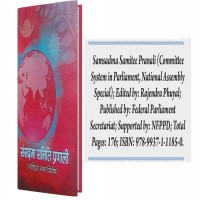For Strengthening Parliamentary Committee System
Liladhar Upadhyaya
Nepal's parliamentary system endures its own customary as well as innovative influences from democratic practices from across the world.
The documentation of lessons to rectify the lapses for future purposes is an age-old trend to gain and transfer knowledge to the next generation. Proper documentation of history helps maintain the future course for an institution that is established to strengthen democracy.
The under-review book, entitled Samsadma Samitee Pranali (Committee System in Parliament, National Assembly Special), is an endeavour to keep a record of history and to give guidelines for the future.
Published by the Federal Parliament Secretariat with the support of the National Forum of Parliamentarians on Population and Development (NFPPD), the book consists of 10 articles highlighting various aspects of the committee system in the Upper House of the Federal Parliament in Nepal.
Edited by Secretary of the National Assembly Secretariat Rajendra Phuyal, the volume is a conceptual framework of the committee system. The book also incorporates the overall practices of parliamentary committees at home and abroad.
The book combines the views of parliamentarians working in the capacity of committee chairs as well as experts who have observed the parliamentary system from outside. The committee systems of Australia, the United States of America and India are presented as a comparative analysis of parliamentary practices at the international level.
Every parliamentary system in the world has a committee system and it is called a mini-parliament. The committee system is an integral part of any parliament as parliament finds it difficult to perform duties in the absence of such committees. As both Houses of parliament include a large number of parliamentarians, the formation of various committees eases the burden of the parliament.
People's representation, expression of people's aspirations, law formulation, parliamentary oversight and control over government's performance, maintaining financial discipline, promoting transparency and maintaining checks and balances are performed through the committee system of the parliament.
Releasing the book, President Bidya Devi Bhandari had earlier thanked the National Assembly for its mature performance within a short period. The Upper House of the parliament was constituted through elections after the promulgation of the new constitution in 2015.
"The book is a compilation of our own best practices and experiences of the parliamentary system and it will help understand practices and effectiveness of the committee system. The publication of the book is a great contribution towards strengthening the parliamentary system in Nepal," stated Ganesh Prasad Timilsina, chairperson of the National Assembly, in his introductory note in the book.
Topics of the book are- Legislation Management in National Assembly, Intergovernmental Relations of Three Levels and Committee System, Efforts of Parliamentary Committees to Achieve Sustainable Development Goals, Rights of Differently Able Persons and Representation, Discrimination is Powerful than Law, Effectiveness of Committee System in Federal parliament and Delegated Legislation and Government Assurance.
This book is a departure point for carrying out further research on the parliamentary committee system in Nepal. A replica of the theory and practices of the committee system, the book gives ample information on the achievements made by the Federal Parliament of Nepal, specifically about the committee system in the second chamber.
Recent News

Do not make expressions casting dout on election: EC
14 Apr, 2022
CM Bhatta says may New Year 2079 BS inspire positive thinking
14 Apr, 2022
Three new cases, 44 recoveries in 24 hours
14 Apr, 2022
689 climbers of 84 teams so far acquire permits for climbing various peaks this spring season
14 Apr, 2022
How the rising cost of living crisis is impacting Nepal
14 Apr, 2022
US military confirms an interstellar meteor collided with Earth
14 Apr, 2022
Valneva Covid vaccine approved for use in UK
14 Apr, 2022
Chair Prachanda highlights need of unity among Maoist, Communist forces
14 Apr, 2022
Ranbir Kapoor and Alia Bhatt: Bollywood toasts star couple on wedding
14 Apr, 2022
President Bhandari confers decorations (Photo Feature)
14 Apr, 2022











